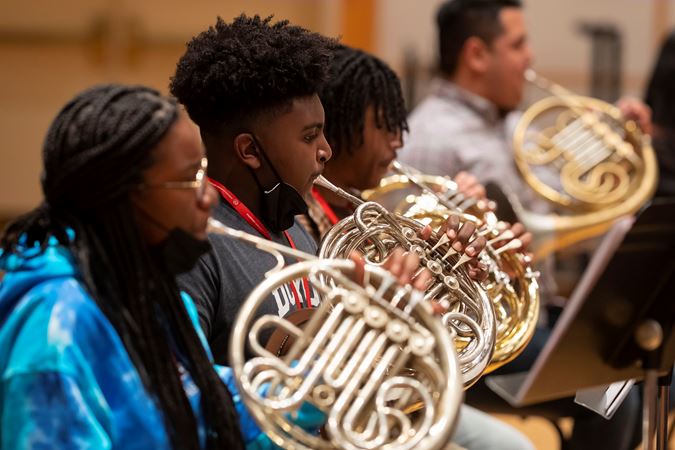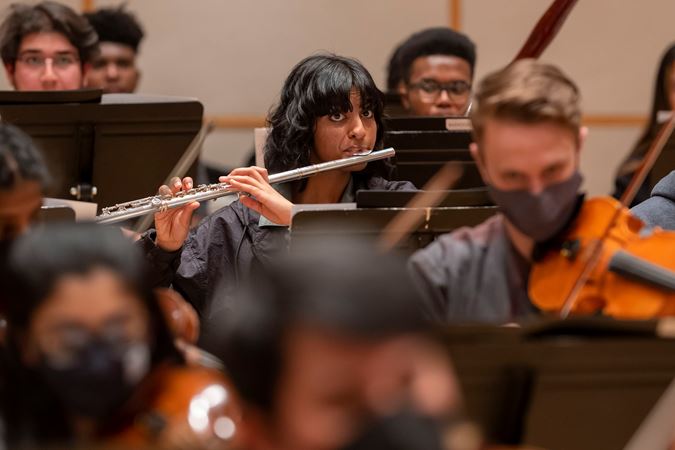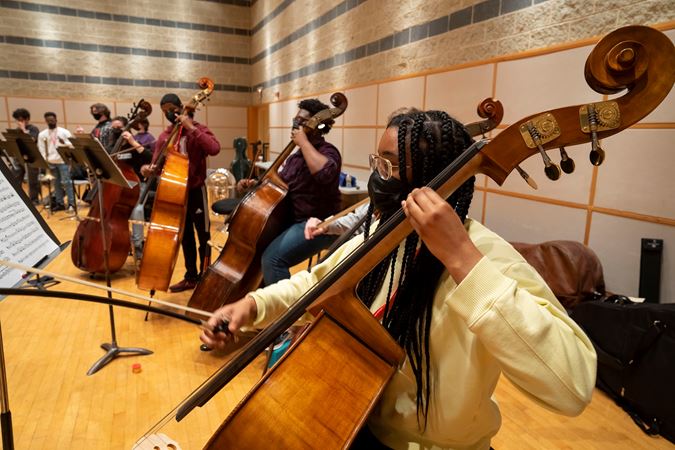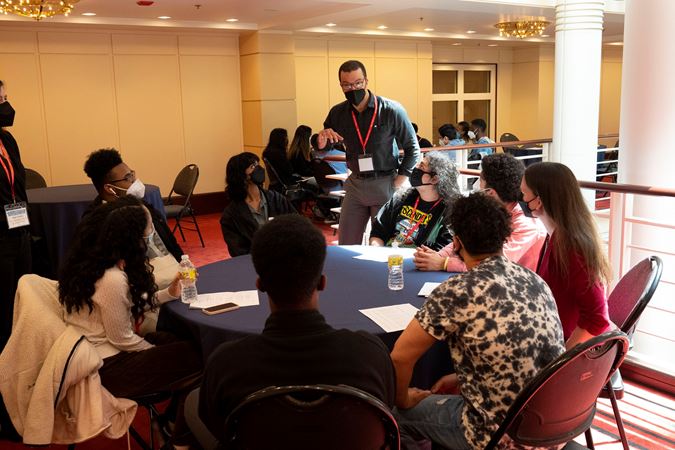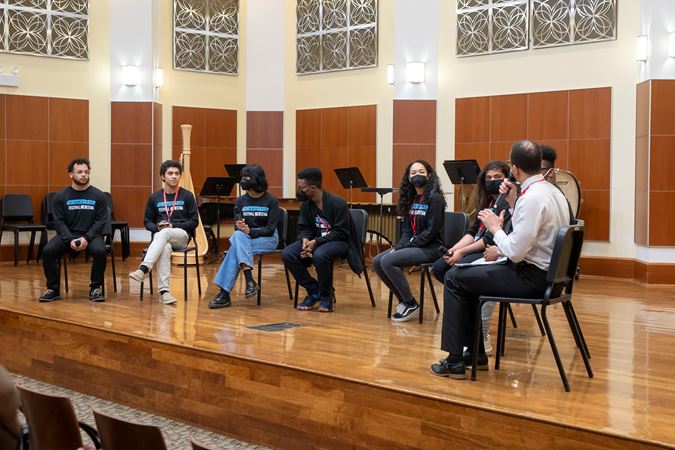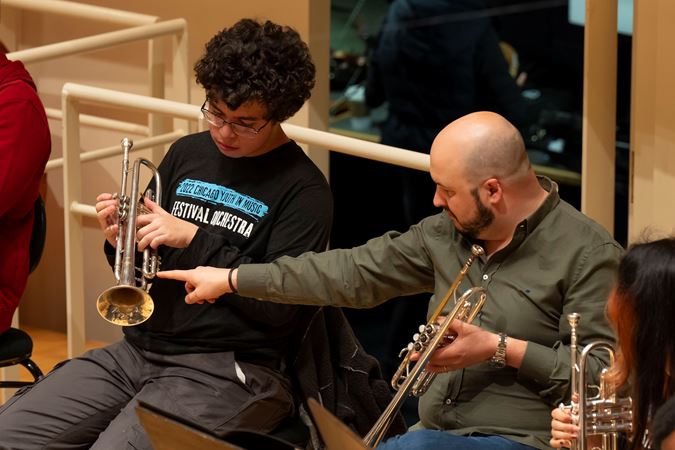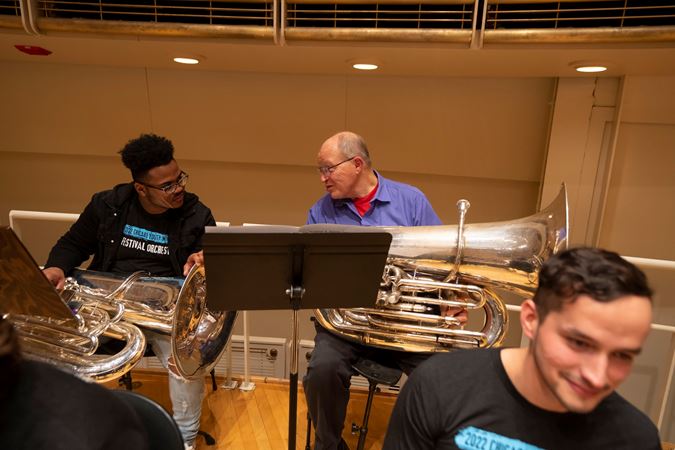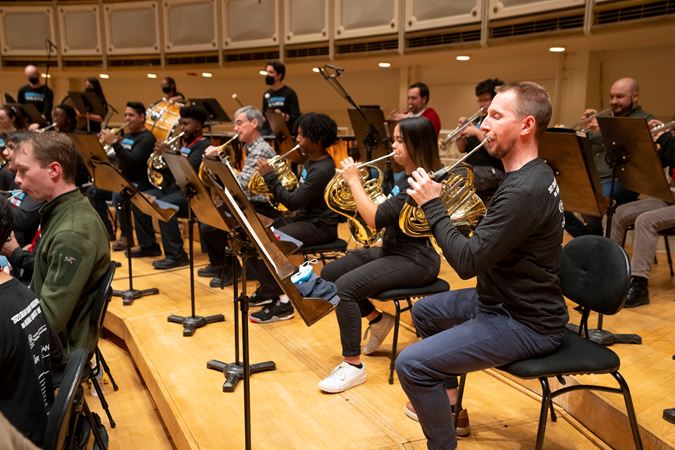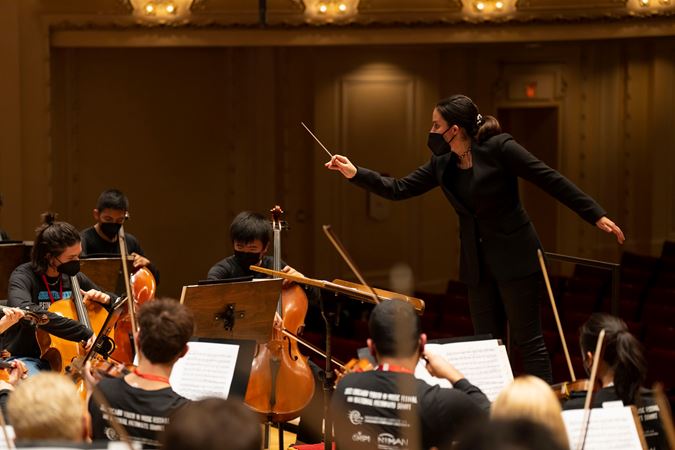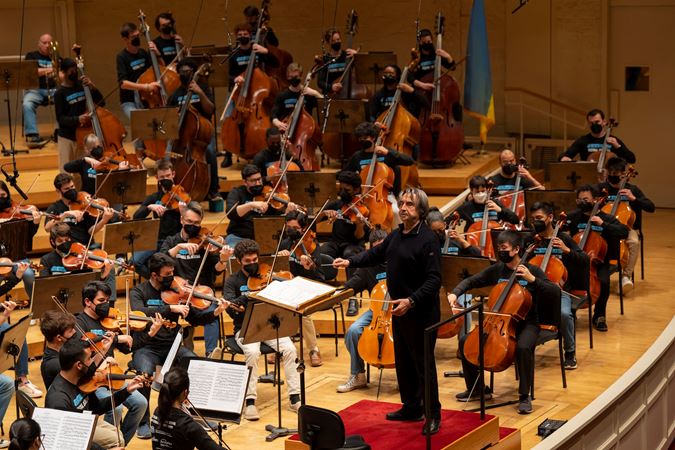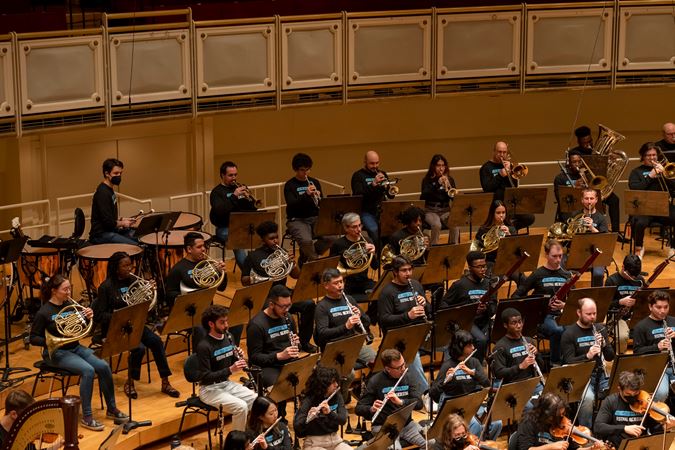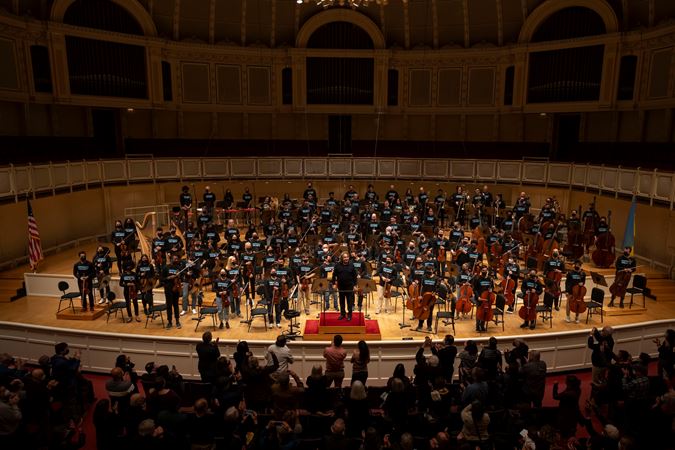CSO Zell Music Director Riccardo Muti conducts the 2022 Chicago Youth in Music Festival Orchestra.
Todd Rosenberg Photography
On the evening of Monday, April 11, more than 100 musicians gathered on the stage of Orchestra Hall for an open rehearsal led by CSO Zell Music Director Riccardo Muti, the culminating event of the 2022 Chicago Youth in Music Festival and National Pathways Summit. Fifty members of the Festival Orchestra were students from Chicago, Baltimore, Philadelphia, Boston, Atlanta, Nashville, San Antonio, Cleveland, Cincinnati and Washington, D.C. With an audience of more than 800 in attendance, these young musicians rehearsed Franz Liszt’s Les préludes alongside musicians from the Chicago Symphony Orchestra, Civic Orchestra of Chicago and Chicago Sinfonietta’s Project Inclusion.
The Chicago Youth in Music Festival, which began in 2009, was reimagined in 2022 as a nationwide partnership with various “pathways” programs, which offer intensive training and other resources to support talented young musicians from backgrounds traditionally underrepresented in American orchestras. In tandem with the Festival, music educators and administrators attended the first-ever National Pathways Summit, where they collaborated on strategies to build a successful future for pathways programs across the U.S. The CSO’s Negaunee Music Institute presented the 2022 Chicago Youth in Music Festival and National Pathways Summit in partnership with the Chicago Musical Pathways Initiative and the National Instrumentalist Mentoring and Advancement Network.
At the beginning of the open rehearsal, Maestro Muti addressed the orchestra and their families and supporters in the audience: “The orchestra is the example of how a society should be … should work. You see the violins, viola, celli, tromboni, oboe, flauti … different instruments that play different parts, but not one part against the other part. … We are here — every orchestra and every chorus — singing and playing different parts in order to reach the final goal, which is la belezza: beauty, harmony for everybody.”
Muti has championed the training of young musicians throughout his tenure as the CSO’s music director, and one special moment during the rehearsal exemplified this commitment to the next generation. Zachary Allen, a fellow of the Chicago Musical Pathways Initiative and oboist in the Festival Orchestra, previously had played for Muti in a remote coaching session on Zoom in March 2021. After Allen performed an oboe solo during the rehearsal, Muti paused to recall their previous encounter, leaving the podium to shake Allen’s hand and congratulate him on his excellent playing.
Riccardo Muti and Zachary Allen, oboist and Chicago Musical Pathways Initiative fellow
Todd Rosenberg Photography
Lina González-Granados, the CSO’s Sir Georg Solti Conducting Apprentice, led the students in rehearsals throughout the three-day Festival. She also gave a keynote address to Festival and Summit participants and conducted the Festival Orchestra in a performance of Valerie Colman’s Seven O-Clock Shout. On the first evening of the Festival, students attended a Chicago Symphony Orchestra concert featuring González-Granados conducting overtures by Rossini and Mozart. Two days earlier, on April 7, she had made CSO history as the first Latina to lead the Orchestra from the podium.
“It’s always very inspiring to work with young musicians,” González-Granados said in an interview on her second days of rehearsals with the Festival Orchestra. “You can give yourself a lot of freedom to give ideas that might not even be in the score, but that are connected to their own human experience.”
In her keynote address, González-Granados emphasized the importance of creating opportunities for young musicians to learn and grow. She cited her own formative experiences of meeting trailblazing female conductors Sylvia Caduff and Marin Alsop, as well as being mentored by Riccardo Muti. Speaking directly to the students, she encouraged them to take advantage of the diverse community brought together by the Festival and to use their musical talents to be “agents of change” and to lift up “voices that have been forgotten.” “You are changing the world one note at a time,” she said.
Lina González-Granados and the 2022 Chicago Youth in Music Festival Orchestra
Todd Rosenberg Photography
Following these inspiring remarks, seven students participated in a panel discussion, sharing their perspectives on the importance of pathways programs and their experiences during the Chicago Youth in Music Festival. Several students expressed how meaningful it was to be part of a diverse ensemble of young musicians from across the country.
“As a member of the Chicago Youth Symphony, I’ve been around Symphony Center. I’ve played at Orchestra Hall, and I’ve sat in orchestras in these same places where we’re all rehearsing today. But never once in my life have I seen so much diversity in one ensemble,” said Anika Veda, a flutist and fellow of the Chicago Musical Pathways Initiative. “The first rehearsal, walking in, I looked around, and I was like, ‘Wow, all of these people look like me.’ You never see that in a professional ensemble, or in a youth orchestra or almost any other festival orchestra. … I think that seriously the best part of the weekend was seeing everybody and playing together and getting to make amazing music.”
Dillon Scott, a violist from Mansfield, Pennsylvania, who is part of the Philadelphia Music Alliance for Youth, added, “I loved seeing the [Chicago Symphony Orchestra] concert on Saturday night, because to me there’s nothing more fun than being in a concert with people my age, and also seeing their heads bob up and down when they listen to music. It makes me feel like I’m not alone, because nobody in my school or my town really listens to classical music. … Seeing kids my age that are as enthusiastic about this music, and as engrossed in what they’re doing — it’s just so fun that there are a lot of people like me that care just as much as I do.”
Vice President for Enrollment and Student Services at Merit School of Music and Project Advisor for Chicago Musical Pathways Initiative Adrienne Thompson noted how inspiring it was for students to play alongside musicians from the CSO under the baton of Riccardo Muti. “Particularly in the low brass section, you have this Chicago brass sound and legend, and so I know the kids from Chicago — tenor trombone and bass trombone — they were completely blown away to be able to sit next to Mick Mulcahy and Charles Vernon. These are people that they have looked up to all their lives, and now they’re actually getting a chance to sit next to them, actually hear them play,” she said. “And then to work with Maestro Muti — it gives them the opportunity to dream, the opportunity to think, ‘This is something that could be part of my future.’”
While the students were engaged in musical activities throughout the weekend, dozens of music educators and administrators from across the country participated in the National Pathways Summit. Over the course of multiple sessions, three working groups held strategic conversations on the topics of efficacy, sustainability and national networking opportunities for pathways programs. Attendees also gathered for larger synthesis sessions and a roundtable event to discuss priorities and action items.
“To have my colleagues around the table, representing conservatories, summer festivals and professional orchestras, really thinking for a couple of days on how we can better support these young musicians — that personally meant a lot to me,” said Stanford Thompson, board chair of the National Instrumentalist Mentoring and Advancement Network.
“[Pathways programs] are so important and are becoming more of an integral part of the orchestral field in general,” said Ryan Walks, manager of the Atlanta Symphony Orchestra’s Talent Development Program. “What stands out to me is the fact that these organizations are coming together and having conversations on why we need these programs, how we will keep them sustained, how we can make them better for the students and our organizations as a whole, and create the next generation of young musicians, highlighting young musicians of color. Being able to talk through these aspects with my colleagues from across the country … was really, really groundbreaking.”
National Pathways Summit participants were encouraged in this work by hearing directly from the students of the Festival Orchestra about the meaningful role that pathways programs have played in their own lives. During the student panel discussion, Jonathan Colon, a cellist from Boston Bridge to Equity and Achievement in Music, said, “In a world with classical music that is expensive, to say the least, I think it’s important to have these programs to bridge the gap between those who have access and those who don’t. … I think this is one of the main ways, and one of the best ways to do it. We see it here today. All of us have been wanting to be a part of classical music, and we’re here today, and we’re celebrating, and we’re here together because of music. Because programs like this exist.”
“I think that the work of these programs should continue because of this long-lasting impact that they’ve had on their students,” said Anika Veda. “And I know not just for me, and everyone on this panel, but for all the students who have been in the orchestra today, I know that our programs have really helped spur our growth and our development as musicians, and as people as we’ve gone on through life. … These are the students that are going to be making changes in the world to come.”
